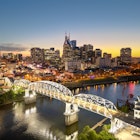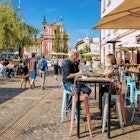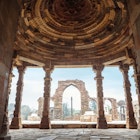
Museums and more in Missouri: art, history and culture in St Louis and beyond

Aug 24, 2018 • 5 min read

Urban cityscape
St Louis and Kansas City are two of the largest cities in Middle America. Yet, while they bookend the same state (Missouri), they are entirely distinct in look and flavor. If St Louis is a place of historic brick-red buildings, heart-tugging blues and toasted ravioli, Kansas City counters with Art Deco architecture, blaring jazz and smoky barbecue. To travel between these vibrant cultural hubs is to rewrite everything you thought you knew about America’s Heartland.
Gateway to the American West
Most people’s first introduction to Missouri is the iconic Gateway Arch. Fresh off a $380-million facelift, it swoops above the mighty Mississippi River, serving as a timeless reminder of St Louis’ vital role as the gateway to the American West.
Beneath this sinewy semicircle of stainless steel you’ll find the Gateway Arch National Park, whose new museum tells the hardscrabble tales of America’s 19th-century westward expansion.
St Louis shed its frontier persona and burst into the 20th century with a fresh outlook as host of the 1904 World’s Fair, the grounds of which have since been converted into the 1371-acre Forest Park. This sprawling greenspace is 528 acres (214 hectares) larger than New York’s Central Park, and it holds some of the city’s most prized cultural institutions amid its lush forests and bird-filled wetlands.

Perched atop a grassy knoll at the western edge of the park, the Saint Louis Art Museum houses an encyclopedic collection of both ancient art and contemporary that spans more than 34,000 works. This stately Beaux Arts-style building has expanded greatly over the past five years with the addition of a leafy sculpture garden and a modern East Wing where Monets, Picassos and Van Goghs all share coveted wall-space.
On the southern edge of Forest Park, the hyperboloid-shaped planetarium signals your arrival at the Saint Louis Science Center, which claims an astronomical 700 interactive exhibits spread across ten galleries. Among the mix are regular live science demonstrations and a motion-based virtual reality ride that launches you into outer space.
Singing the blues
If there’s a soundtrack that underpins everyday life in this riverside city it’s the lyrical syrup of Mississippi blues. Indeed, it was St Louis’ rollicking music halls that rocketed the likes of Chuck Berry, Miles Davis and Ike and Tina Turner to global stardom.
St Louis blues music is characterized by its heavy use of the piano. You can learn more about this distinctly American style – and its legacy in modern-day rock – at the highly entertaining National Blues Museum. Then head out to some of the city’s fabulously eclectic live music venues – including Chuck Berry’s old haunt, Blueberry Hill, and the neighborly Venice Café – to melt into a haze.

Small town charm
America’s most famous early explorers, Meriwether Lewis and William Clark, set off on their epic all-water route through the ‘Louisiana Territory’ to the wild West Coast from the historic French-founded outpost of St Charles, about 20 miles northwest of St Louis. The Lewis & Clark Boat House & Nature Center overlooks the spot along the Missouri River from which the pair departed on May 21, 1804, and explores the legacy of their journey through replica boats and historic artifacts.
The cobblestoned streets of St Charles are lined in cutesy cafes, galleries and artisan shops – perfect for lingering away an afternoon. For more small-town Missouri charm head 100 miles north to Hannibal, the place that gave America two of its most legendary literary folk heroes: Tom Sawyer and Huckleberry Finn.
Samuel Clemens (aka Mark Twain) grew up in Hannibal, and his Boyhood Home & Museum reveals the real-life townsfolk here who inspired his fictional characters. From Hannibal you can set off on your own Twain-inspired Mississippi River adventure aboard a waiting riverboat, returning in time for honorary suds at the Mark Twain Brewing Co.

High life on the prairie’s edge
Glorious Art Deco towers rise above the prairie like rows of wayward cornstalks as you head west toward Kansas City. Dubbed ‘the Paris of the Plains,’ its attractive streets are home to more than 200 gurgling fountains.
Among its world-class institutions is the hilltop National WWI Museum and Memorial, which houses America’s largest collection of Great War artifacts. Access is via a glass bridge over a field of 9000 red poppies, while exhibits inside the 32,000-square-foot (3000-square-meter) space trace the war from its origins to the 1919 Paris Peace Conference.
Across town, the Nelson-Atkins Museum of Art showcases one of America’s finest collections of Asian art (think Ancient Chinese jades and delicate paper screens from Japan), while the edgier Kemper Museum, just steps away, shines a light on emerging painters and photographers in the contemporary scene.
In the historic 18th & Vine district, the illuminating Negro Leagues Baseball Museum dives into the history of African American teams that thrived across the US before baseball was finally integrated in the late 1940s.
The cradle of jazz
The 18th & Vine district is also ground zero for Kansas City’s electric jazz scene. The delightfully interactive American Jazz Museum provides a worthy introduction to the genre, as well as local legends such as Charlie Parker, pioneer of the blazingly-fast bebop style. Watch the new generation test their chops at the museum’s intimate Blue Room jazz club where the walls are a veritable hall of fame highlighting the greats who first crafted Kansas City jazz into what it is today.
Half a block away – and housed in a former union hall for African American musicians – the Mutual Musicians Foundation is the stuff of Kansas City legends. Its late night jam sessions start around 1am on Friday and Saturday nights, when performers are done with their evening shows elsewhere, and run all the way to the crack of dawn. Expect seasoned veterans gigging with next-gen talent, free-flowing whiskey and utterly rapt crowds.
Lonely Planet has produced this article and video for Missouri Division of Tourism. All editorial views are those of Lonely Planet alone and reflect our policy of editorial independence and impartiality.
Explore related stories






 Road TripsThe 7 best road trips in Arizona to discover ancient culture and modern wonders
Road TripsThe 7 best road trips in Arizona to discover ancient culture and modern wondersNov 8, 2024 • 6 min read

 BeachesCroatia itineraries: 3 routes to explore the cities, coasts and interior
BeachesCroatia itineraries: 3 routes to explore the cities, coasts and interiorNov 8, 2024 • 6 min read

